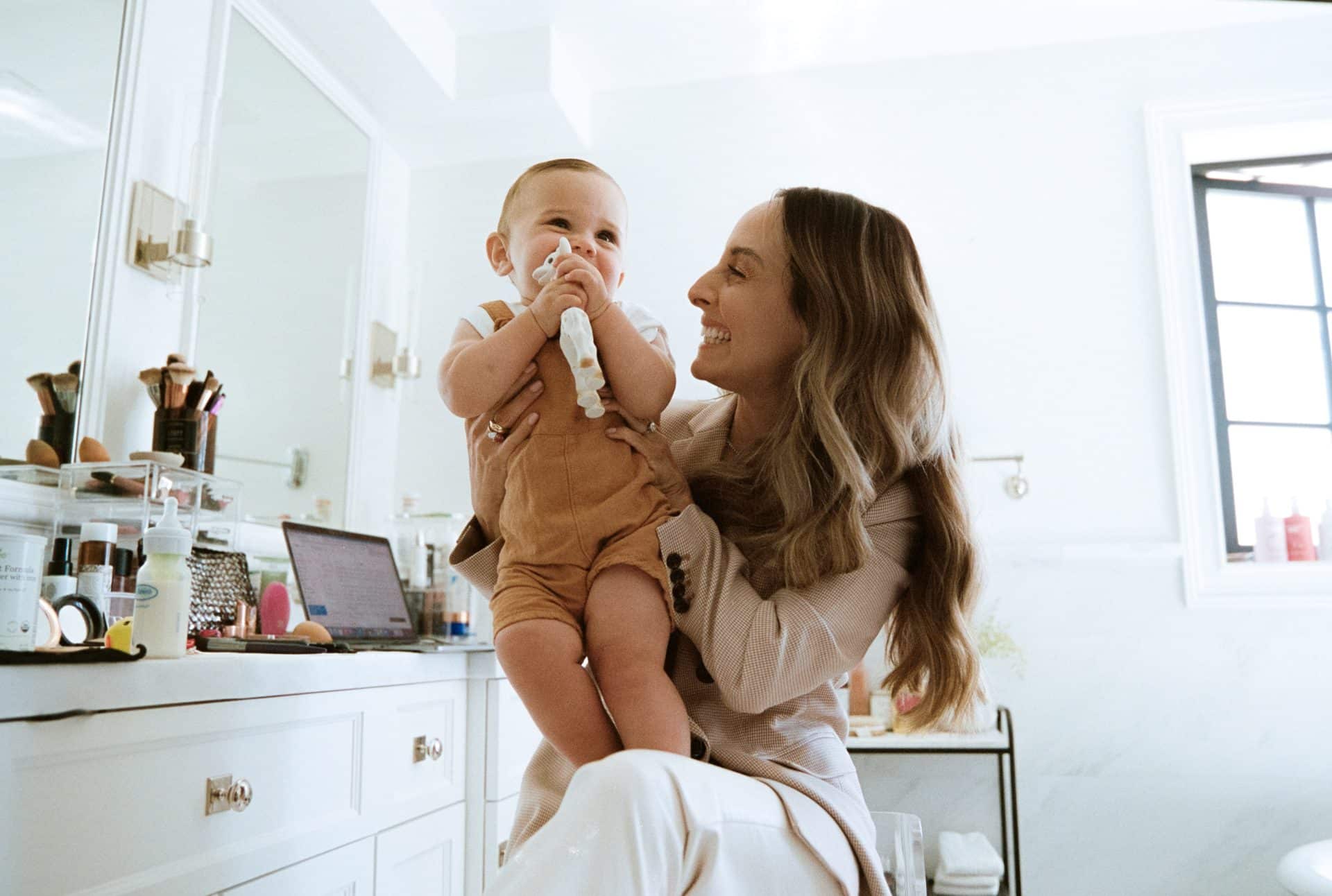We’ve all watched as Lilliana Vazquez sparkles on the big screen. Her strong, confident smile radiates genuine warmth with a maternal tenderness. Getting to be that mom has been a journey, however, one that took six long years of nerve-wrenching fertility efforts.
Although her Latina community generally does not encourage talk of infertility, miscarriage, or therapy, Lilliana is here to share her truths— the failed rounds of IVF, the dreaded two week wait time and the sadness and anxiety she felt when finally pregnant.
Lilliana struggled to find joy in her pregnancy and worried that every day would be the last. Maternal mental health therapy helped her work through perinatal distress, empowered her to prioritize her mental wellbeing and encouraged her to not embrace motherhood alone.
I will never let my therapist go!
Lilliana Vazquez
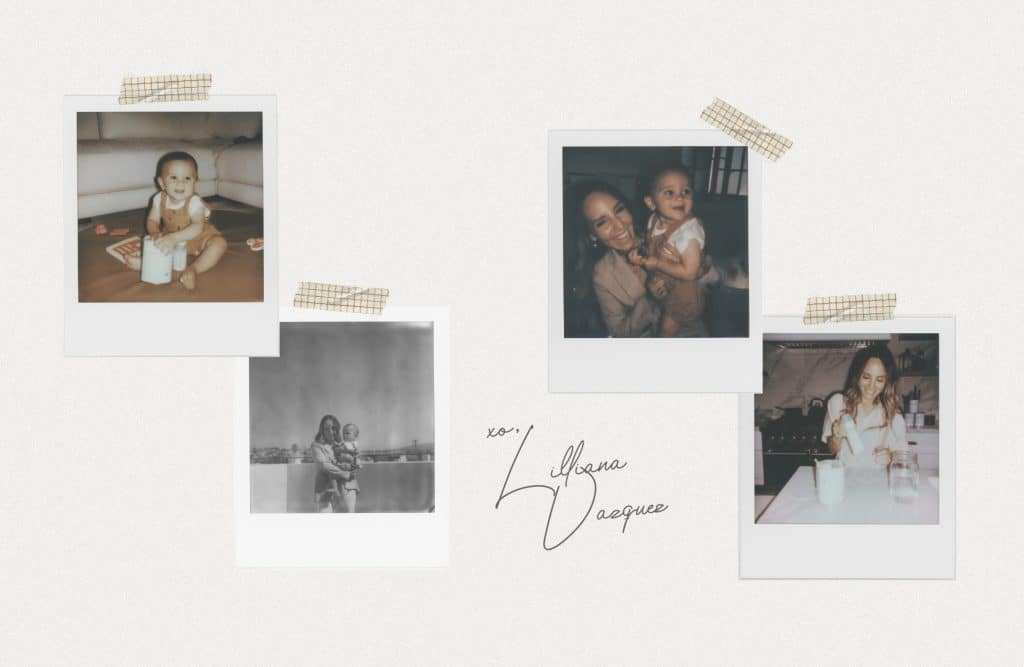
How did your journey to motherhood begin?
I never really saw where motherhood would fit in. I knew that I wanted a family, but it wasn’t my first priority.
Then everything changed when I got a call from my doctor letting me know that my AMH levels were really, really low, especially for somebody my age. I was only 35 years old, and she basically equated my AMH levels to somebody that was about to go into menopause. I hadn’t even thought about the word menopause, but what I really hadn’t thought about is how that would really impact my ability to have a baby.
All of a sudden, I saw everything in focus, and I knew that from that point on, my focus was going to be on starting a family. It really just took somebody suggesting that opportunity, and that the option was going to be taken away from me, for me to really realize how badly I wanted to be a parent.
How did IVF begin for you?
My physician referred me to my IVF physician in New York, the first IVF doctor I saw.
Patrick, my husband, and I talked about it and thought, okay, we have friends that have gone through this, and IVF is a solution to having a baby. You just go get IVF, and then you get a baby. I figured this will take a couple of months. Right? I was 35. I would go through maybe a round of IVF, and then I would be pregnant, and nine months later, I would have a baby.
Did IVF go as you thought it would?
Sadly, no, that was not my scenario. For me, I went through dozens of failed IUI cycles, a handful of failed IVF cycles, and all in all from start to finish for us it took about six years. In my head, I had planned emotionally and physically for about six months. It was a journey that I could have never predicted. It was a journey that I never expected.
I think I completely underestimated how difficult IVF is, how isolating it can be, and how taxing it is on the women that go through it.
Did you feel shame when you couldn’t become pregnant?
I made a decision when I started IVF that I wanted to keep my treatment private. For me, and I think it comes a lot from my background being half Mexican and half Puerto Rican, there is such a shame and a stigma built into infertility. We don’t talk about infertility. We don’t talk about miscarriage. So these are not conversations that I was having with my family; with my community.
Growing up, you think, I’m just going to snap my fingers, and it’s going to happen. Women are just supposed to get pregnant. It’s the one thing we can all do. Right? Well, it’s not. Some women can, but I didn’t fall into that category. It was the hardest thing that I’ve ever done in my life. And because I felt so much shame about it, I chose to go through this journey by myself. Alone.
I was riddled with shame about not being able to get pregnant.
Who did you talk to about IVF?
The only people that really knew what was going on were my physicians, my nurses, one very, very close friend, my husband, and my mom. I never shared this with my brother. I never shared it with my in-laws. It was a very, very tight, small group of people. As I went through more and more failed cycles, I realized that I couldn’t do it alone anymore. Some of the closest people in my life couldn’t believe that for the last six years, I had been suffering in silence.
As a Latina woman, did you feel pressure to have a baby?
I got married at 27. At 35, I had already been married a good amount of time, at least in my family’s eyes, to be starting a family. During the first couple of years of our marriage everybody kept asking. My mom was asking, my grandmother was asking, my cousins, my aunts, my cousins, everybody was asking. My friends were asking.
I thought I had the rest of my life to get pregnant. But I will say that culturally being half Mexican and half Puerto Rican, there is so much pressure to have a family. If you don’t make that decision, what does that say about you? Are you selfish? Why aren’t you maternal?
It brings up all of these questions that I think women really battle with throughout their lives.
Was it hard to tell your family about your IVF journey?
Most of my family’s Catholic, so you’re talking about a very layered and complicated conversation when it comes to IVF. I felt like I had to educate myself so much when it came to advanced reproductive technology, and I didn’t want to also have to educate my family. I didn’t want to have to answer the questions. I was still figuring out the answers for myself. My husband was still figuring out the answers. I didn’t feel like I was in a place to take on the burden of educating everyone in my community on IVF when I still didn’t know enough about it.
Tell us about the dreaded 2 week wait during IVF
I found out I was pregnant in a very different way than I had ever imagined it. I had taken countless pregnancy tests leading up to this moment. We transferred an embryo on election day 2020. Of course, everybody knows that immediately after you transfer you go into the dreaded two-week wait. Two weeks feels like an entire lifetime.
How’d you find out you were pregnant?
I was at home, upstairs in pajamas, and I was like, you know what? I’m going to run to the drug store and get a pregnancy test. I was getting my shoes on and my phone rang. It said unknown. The only reason I answer an unknown call is because my doctor shows up as an unknown caller.
I thought it was weird that he was calling me at 7:30 on a Monday night. I picked up the phone and he was like, “Lilliana?” He’s very stern, very monotone. I said, “Yes.” And he was like, “Congratulations! You’re pregnant.” And I said, “What? Wait, what? I was literally about to go to the drugstore to pick up a pregnancy test.”
He said, “We ran your test today, and your levels, while are super high, I feel super confident in that they’re showing us you’re pregnant. It is a little bit early, but I thought if anyone deserved to know early, it was you. You’ve waited a really long time for this.”
How did you tell your husband Patrick about the pregnancy?
I never thought that I would find out I was pregnant while sitting at home by myself. My husband and I had been through so much together I thought that we would be together and we would pee on a stick and find out.
I immediately called him and I said, “I’m pregnant.” He didn’t say anything because I think we’d been waiting for that for so long. The thing about this is that we had tried so many times. We had fought so many times, and I think we had both gotten to a place where we were really excited for the future because we knew we were going to be parents.
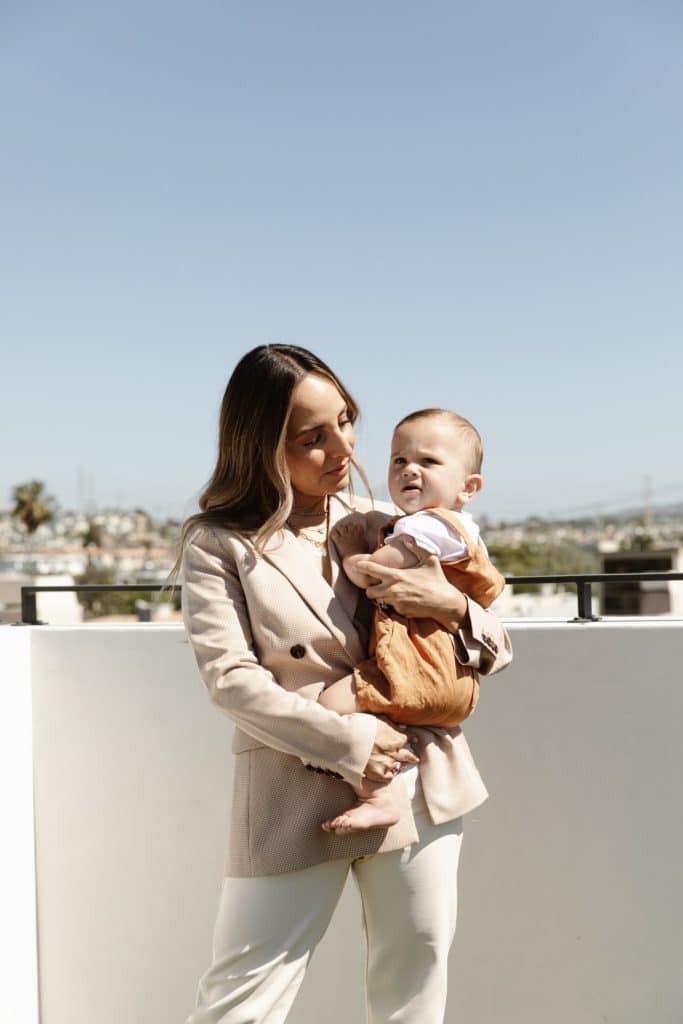

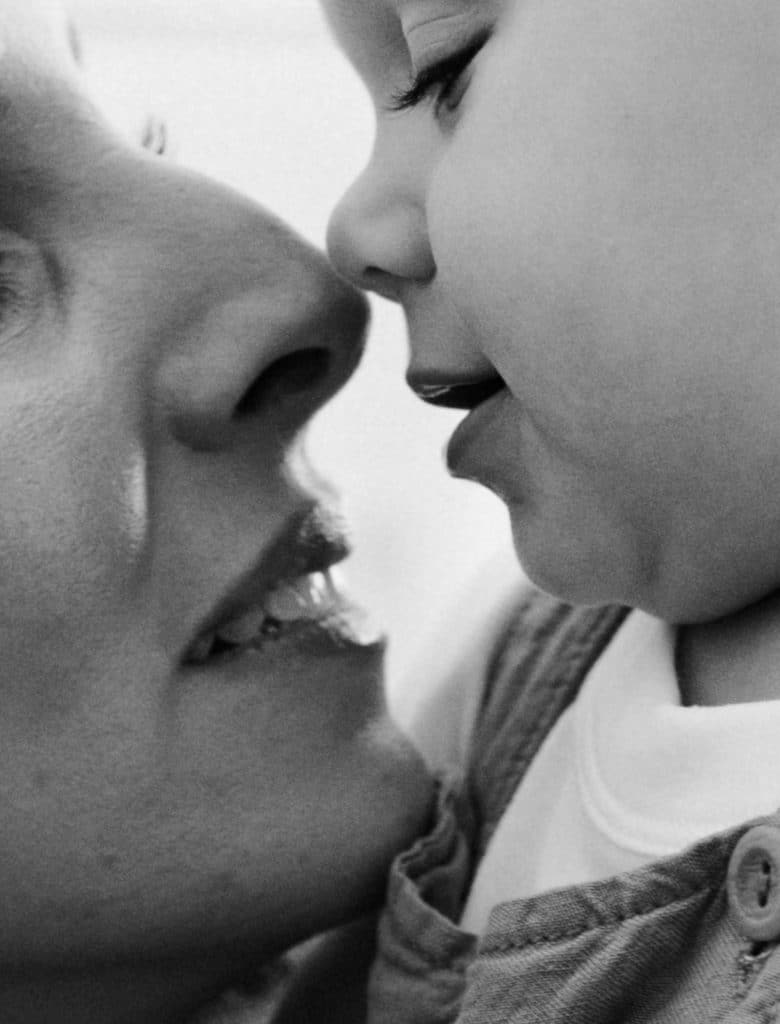

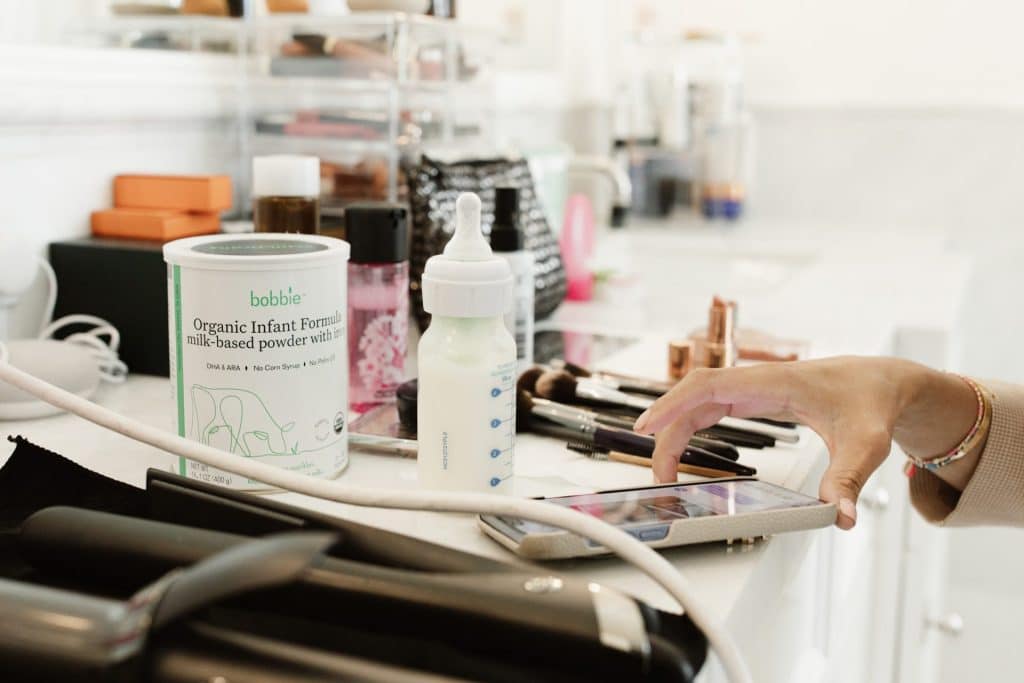
Did you consider adoption or surrogacy?
We gave up on the idea of pregnancy because it was no longer about pregnancy for me. It was about parenthood. And it took me five years to get there. But in that last year, especially when we went into COVID, we said it doesn’t matter if we’re pregnant.
Quote: It doesn’t matter where this baby comes from. Whether it’s adoption, surrogacy, or donor. We are going to be parents, and there is nothing that is going to stop us.
Pregnancy was a bonus, but I think we never thought we were going to say we’re pregnant. I think we were always, at that point, going to say we’re parents. It was the best surprise I could have ever dreamed of.
What was your mental state during the IVF process?
When I was going through each failed round of IVF, I had to bottle up all of the emotions that came with that. The frustration, the anger, the fear, the anxiety, the pain, the trauma, and just bury it and put it aside. Because if I processed all of that, I felt like it was going to keep me from trying again because it hurt so bad.
For six years, every time we lost an embryo, every time a transfer never took, every time we had another canceled cycle, I would take all of that loss and just put it away. And I put it away for six years. I thought that by putting it away, it meant that it disappeared. I really made a huge mistake in thinking that. I think that, especially for women, IVF is so deeply personal, and you experience it not just on an emotional level but on a physical level.
When I got pregnant, all of a sudden, I breathed for the first time.
When did you know you were suffering from maternal depression?
All of the trauma and all of the loss that I experienced for six years came bubbling up, and I was playing whack-a-mole with my emotions. Right? I was like, no, not today. No, not right now. Don’t think that thought.
But after a while, you just can’t fight off all of those negative feelings anymore. Here I was pregnant after six years, living in what is supposed to be the most joyful time of my life, and that was the face that I put on, but inside I was crying all the time. I was so sad all the time. While I was so happy to have what ultimately would become my baby in my belly, inside my heart and in my mind were all of these really negative, scary thoughts.
I wondered— Is this going to end today? Is it going to end tomorrow? How long am I going to be pregnant for? Is something wrong with this pregnancy? Am I too old to be pregnant? What is wrong? Something has to be wrong.
How did you deal with depression during pregnancy?
I was supposed to be joyful. I was supposed to be happy. I was supposed to be celebrating, but I wasn’t. I was grieving the loss of embryos, of transfers. I was riddled with grief and anxiety for the most part of my first trimester and my second trimester until my doctor and my husband really made probably the most valuable suggestion that anyone has ever made in my life, which was: YOU NEED TO ASK FOR HELP.
I am not good at asking for help. My mom is one of the strongest women I know, and she’s not good at asking for help. I felt like growing up, asking for help was a weakness. It was showing weakness instead of showing strength. When I was suffering from this crippling anxiety, and borderline depression during my pregnancy, I didn’t want to ask for help because I thought it would make me weak. I thought I could handle this. I battled infertility for six years. I’m pregnant now; I got this.
When did you admit that you needed help for depression and anxiety?
I was really lucky that my doctor, my OB/GYN, and my husband really saw that things were not okay. At their suggestion, I called Dr Salick, a therapist who specializes in maternal wellness, and we started a beautiful relationship that still exists now. I was in my second trimester and I just wasn’t myself.
When I look back, I recognize that in myself, but I wasn’t brave enough to admit it. I wasn’t brave enough to say I can’t do this on my own. I can’t do it alone. And I’m lucky that I am so loved by somebody who could see that I wasn’t myself and that I think also loved this baby so much who forced me to really go out and do what I could to save me and to save this baby.
Did you always believe in therapy?
It’s funny because I’m such a big believer in therapy. I’ve had a therapist in my life prior to my pregnancy for going on four years and I’m such a supporter of therapy. I think it’s a game changer. Professionally, personally, in all of my relationships, and most importantly, in the relationship that I have with myself.
What did you learn about perinatal depression?
I didn’t even know that there were therapists who specialized specifically in maternal wellness. I didn’t even know that was out there. And it’s funny because you’re going through IVF, you would think that in the same way that they’re prescribing a protocol, that’s full of hormones and shots and injections and drugs, that they would also be saying, you know what? You also need to take care of your mental health so you should also be seeing a therapist. Nobody said that to me during my entire six years of doing this.
Was perinatal therapy successful for you?
It was a game changer for me. I think because I was in the practice of going to therapy, that I got to a place that really supported my pregnancy very quickly.
I know what it’s like to sit with someone and just bear it all in a therapy session. I also know how to focus on the things that I really felt were missing in my life when it came to pregnancy. We focused on that together. My therapist helped me understand that what I was feeling was totally normal and completely okay.
The world thinks that women are just supposed to be joyful and happy and without a care in the world when they’re pregnant. We all have doubts and anxiety and we’re fearful. We want the best for these babies and we’re trying to do our best. And we’re trying to balance career and an impending motherhood and relationships.
It helps to know that those feelings are totally normal and expected. And you shouldn’t feel shame about feeling sad during your pregnancy.
We talk about postpartum depression all the time, but we never talk about depression during pregnancy.
So as much work as we’ve done to normalize postpartum anxiety and postpartum depression, we also need to work to normalize these feelings while you’re trying to build your family, whether you’re going through IVF or not.
Were you vocal about seeing a therapist?
For somebody who is so forward facing on television, I’m a surprisingly private person. My husband’s also really private. We are private as a couple. In the beginning, while I was feeling out the relationship and seeing what therapy could do for me, I kept it to myself. I didn’t even tell my mom because there’s so much stigma around mental health in the Latina community. I didn’t want her to worry unnecessarily.
But as soon as I realized how empowering therapy was and how important it was to me feeling confident as a mother and finally feeling joy again, I was shouting it from the rooftops. Anytime I’d see a pregnant person, I would be like, how are you feeling? Do you love your doctor? Are you seeing a therapist?
I couldn’t believe how life changing seeing my doctor had been for me in that second trimester when things felt really dark.
Are you still seeing a maternal therapist?
Yes. I’m never letting her go.
Did you continue therapy through the 4th trimester?
I’ve talked about how much focus there is on postpartum anxiety and postpartum depression and I think that seeing a therapist actually helped me feel really strong going into the fourth trimester. There’s so much focus on the baby in the fourth trimester and beyond, but there’s no focus on mom. And we all know that if mom is not okay, baby is not okay.
Even though I felt so much better in my second trimester and was feeling amazing in my third trimester, I knew that commitment to bettering myself as a woman and as a mom was going to last long after I gave birth to Santi. I made it a standing appointment. I gave birth to my son on a Monday and had my therapy session on Friday when I got home.
I got on zoom with my therapist to talk about everything. And the tears were flowing. The hormones were raging. It was an intense session. And I don’t know what I would have done without her those first four weeks. I was completely lost.
Nothing can prepare you for the shock that is new baby and motherhood.
How did therapy help you postpartum?
I did not know what was up and what was down. Without my therapist’s guidance, I don’t know how I would’ve gotten through that first month, but I am so happy that I had her in place. And I think that’s the thing that is so important. When we talk about maternal wellness, we need to spend as much time on ourselves as we do planning baby showers, nurseries and shopping for baby.
We spend so much time on the things that don’t really impact how we see ourselves and how we operate as mothers. We need to focus on ourselves more when it comes to mental health.
Did you plan to breastfeed?
I went into the hospital thinking: I don’t know if I’m going to breastfeed and I don’t know if I’m going to formula feed. I was open to all feeding options. That was always my approach. I wanted to set myself up for success. And that was something my therapist said to me. She said, “Don’t focus so much on a birth plan because we all know that birth plans sometimes go out the window.”
Don’t focus on whether you’re a bad mom if you don’t breastfeed. Don’t focus on being a bad mom if you formula feed. Just set yourself up for success and say, I just want my baby to feel love and nurtured and taken care of. I want to love and nurture and take care of myself. There was not this pressure. I, at least, did not put pressure on myself. The outside world puts a ton of pressure on moms, especially if you make the decision to not breastfeed.
How did breastfeeding go?
I was super lucky. Santi latched right away in the hospital right after my C-section. We decided to go with it. I came home and exclusively breastfed for the first four weeks.
But then, I noticed that my supply was starting to diminish.
What happened when your breast milk supply dropped?
In my head, I thought I had to either formula feed or breastfeed— there was no in between. I was committed to breastfeeding, but what if my supply isn’t keeping up with my baby’s demand? I became stressed and I started pumping all the time and it wasn’t working. I got scared and didn’t know what to do.
When were you introduced to combination feeding?
My therapist said, “Well, who told you that you can’t feed in combination?” I said, “What does that even mean? What is combo feeding?” This was incredible. She said, “I can’t tell you how many women ask me this question because the world creates two types of moms. You have a breastfeeding mom and you have a formula mom. But nobody tells you there’s a hybrid mom and that YOU can be a hybrid mom.”
Did combo feeding help extend your breastfeeding journey?
Combo feeding gave me a runway to continue to breastfeed my baby. I realized that not only did that mean that my baby would be well fed, but it also meant that if I supplemented with formula, I could extend my breastfeeding journey because I could do this for longer. That’s something that at that time was really important to me. I wanted to get to three months or four months or five months or a year, whatever that number was, still breastfeeding!
The myth that they sell you is that you can’t do both and you absolutely can. Being able to do both extended my relationship with my son through breastfeeding, but it also gave me back so much happiness and time because I was able to do both.
Tell us how you used Bobbie formula for combo-feeding?
We’re told that we can only do one or the other and it makes me so angry. My friends didn’t even tell me about combo-feeding. Most of my friends were like, oh, wait, you’re combo feeding? What’s combo feeding? That’s why I’m so grateful to have found Bobbie formula because like I said, the most beautiful thing that Bobbie did was extend my breastfeeding journey.
As a mom, how do you balance work and family?
You know, people always ask women this super annoying question, which is, how do you balance it all? I give them the answer. I have a therapist. I actually don’t do any balancing at all. On my best day at work I am a shitty mom, and on my best day at home with Santi, I am a shitty employee. I am a shitty storyteller. I am just bad at my job.
I’m okay with making mistakes as I figure out what this life looks like for me. I’ve spent 42 years as myself, as me, as an individual. That was a lot of really selfish moments, and now that’s different. I am discovering who I am as a mom. I’m discovering who I am as a wife with a baby. And so having a therapist really has helped me figure out how all of those versions of me fit together.
I feel like having a therapist helps me balance all of those really complex emotions that we face as mothers with guilt being the main one that I think we all suffer from.
I don’t want to feel guilty for wanting to have margaritas with my friends. I don’t want to feel guilty for going to get a mani pedi. I don’t want to feel guilty for sleeping in.
We all feel guilt as moms because our babies become our priority. I don’t think that self-care should come with guilt.
What advice do you have for a mom who is suffering?
I know what it’s like to struggle in silence. I think women need to see that there’s so much power and strength in vulnerability, and that could be asking for help. That could be saying, I can’t do this alone. It’s okay to feel that way. I think that vulnerability has become my superpower as a mother.
If I wasn’t able to be vulnerable for myself, how could I be vulnerable with my baby? And it’s one of the things that I’m most grateful for. Don’t be afraid to ask for help. There is no shame in being vulnerable. At the end of the day, therapy is another form of self-care. It’s putting yourself first even if it’s only for an hour a week, because if you take care of yourself, you’re going to do such a better job at taking care of these tiny little humans.
And now for a few rapid fire questions with Lilliana:
Where’s the weirdest place you’ve ever breastfed or fed Santi?
The weirdest place I’ve ever pumped was backstage at the Nick Cannon show.
Best advice a fellow mom has given you:
To embrace the chaos. I’m a control freak, so in all of this, I’m losing my mind. But there is so much beauty in the chaos. That is where all of the really special moments happen.
Tell me a recent time you felt like you were really crushing parenting:
I never feel like I’m crushing parenting! But we’ve introduced solids to Santi, and I have really committed to making meals for him. When I cook him something that he actually eats and he smiles, wants more and just opens his little mouth, that is when I know I’m crushing parenting because I am a terrible cook. I don’t like being in my kitchen. And here I am feeding my child healthy food made from scratch by me. That is when I feel like I’m crushing parenting.
Tell me a time where Santi just made you laugh out loud:
Santi makes me laugh out loud when he discovers new things, and those new things can be everything. That can be when he learns to click his teeth because he cracks up at his own discovery. That can be when he discovers he’s a boy. When he discovers things, he giggles and laughs.
Worst diaper blowout moment?
The worst blowout was on my white couch. Early on, poop can take all kinds of forms and it has different textures and you just never really know what you’re going to get, so there’s always a surprise moment when you open the diaper. I knew he had pooped. I was like oh, he only made the poop face for a second. Just a little tiny one. Let me just throw him down on the couch and quickly change the diaper. No big deal.
I wasn’t really paying attention to the sides of the diaper because I was a new mom. I threw him down on our beautiful, new, white couch and sure enough, it was like the loosest blowout. It just came running, and it was running out the side. The poop dripped all over me, but I saved the couch!
From all of us at Bobbie, we so appreciate you Lilliana for sharing your authentic words of self-reflection and positivity. Thank you.
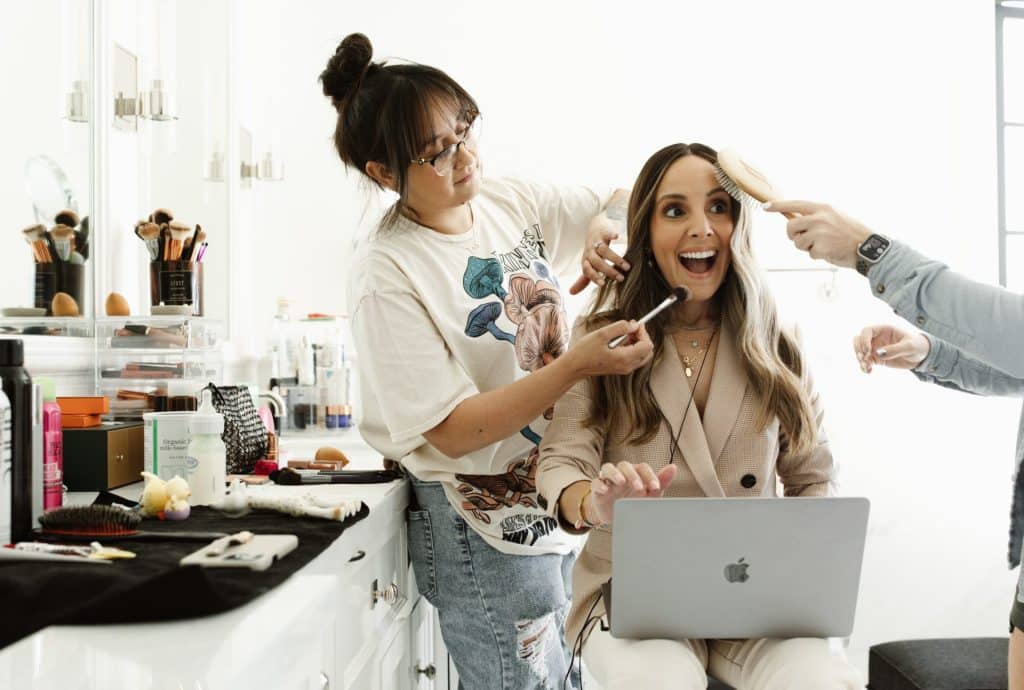
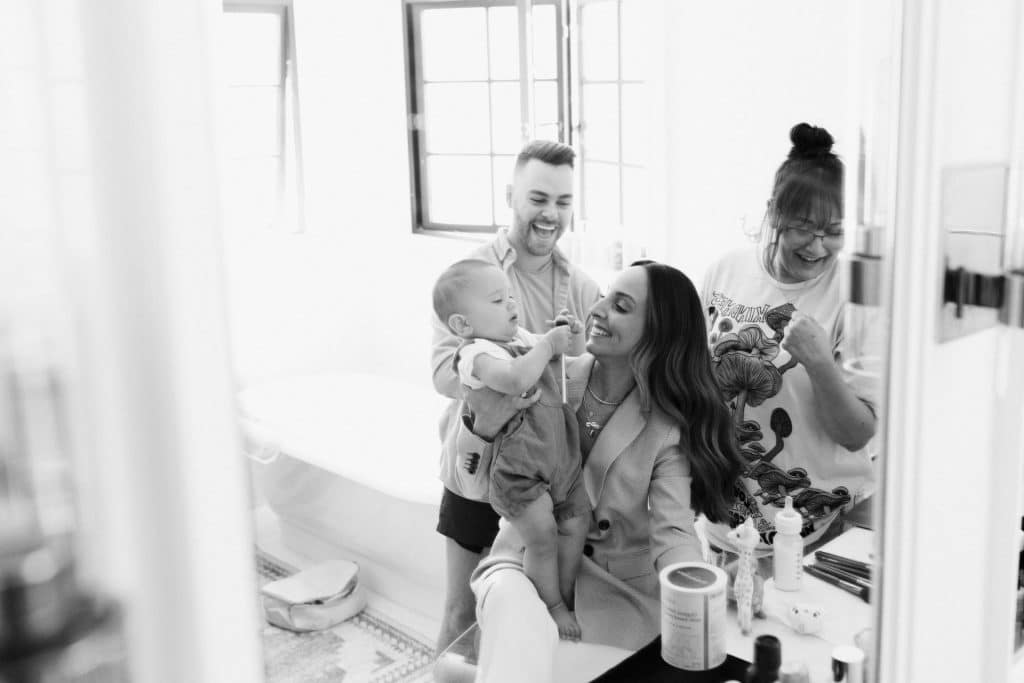
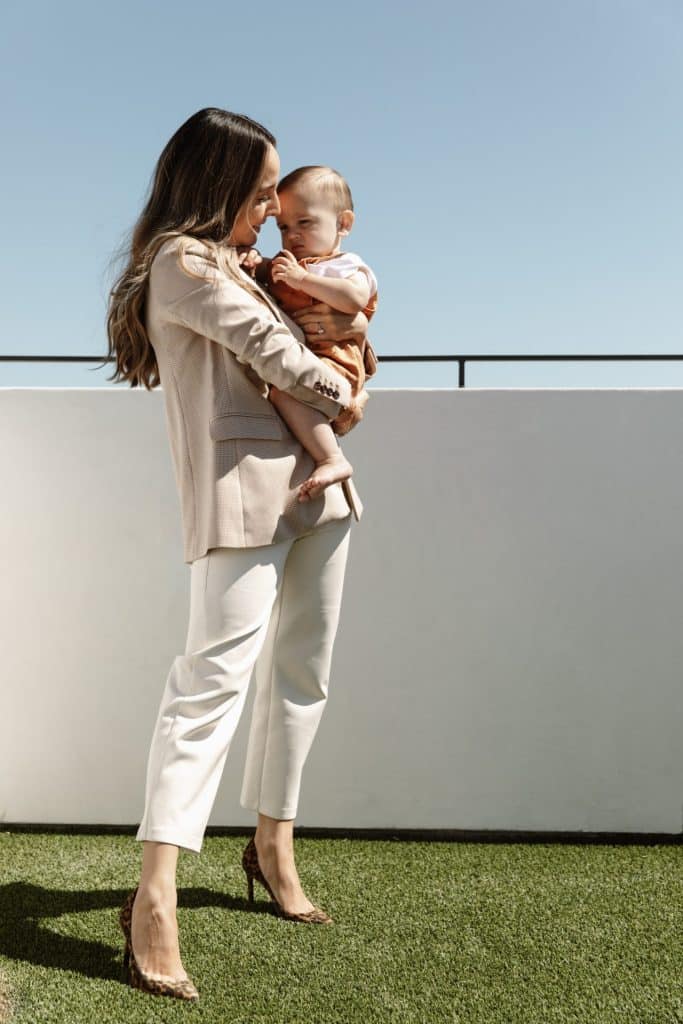
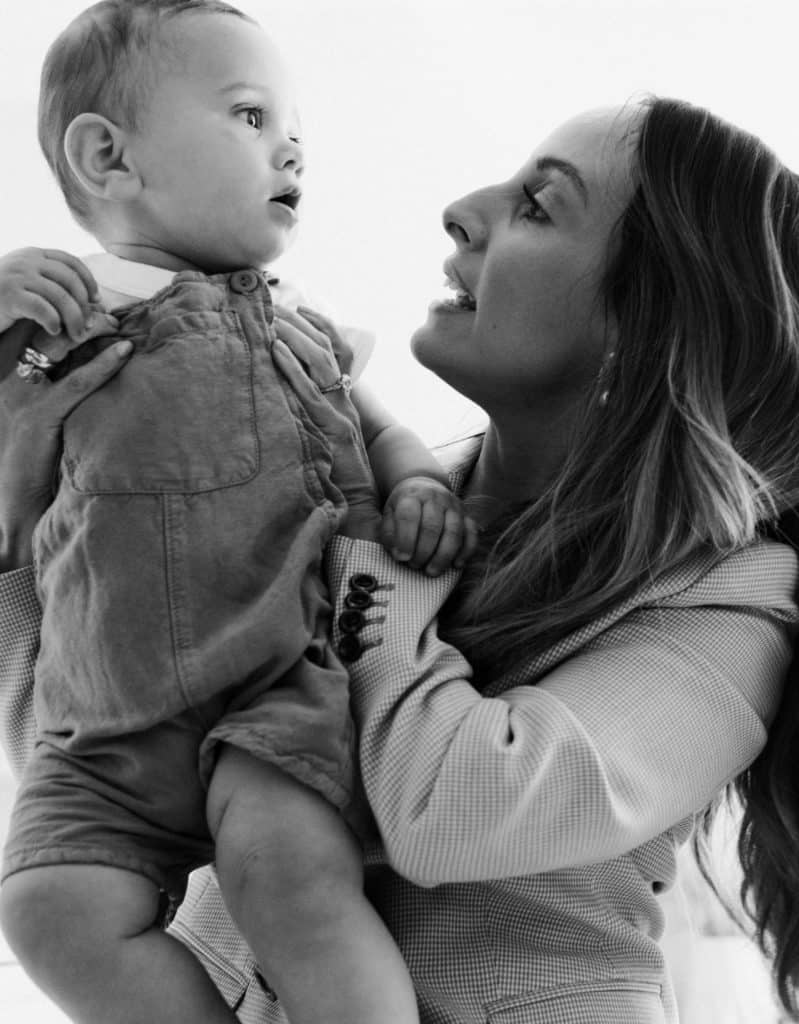
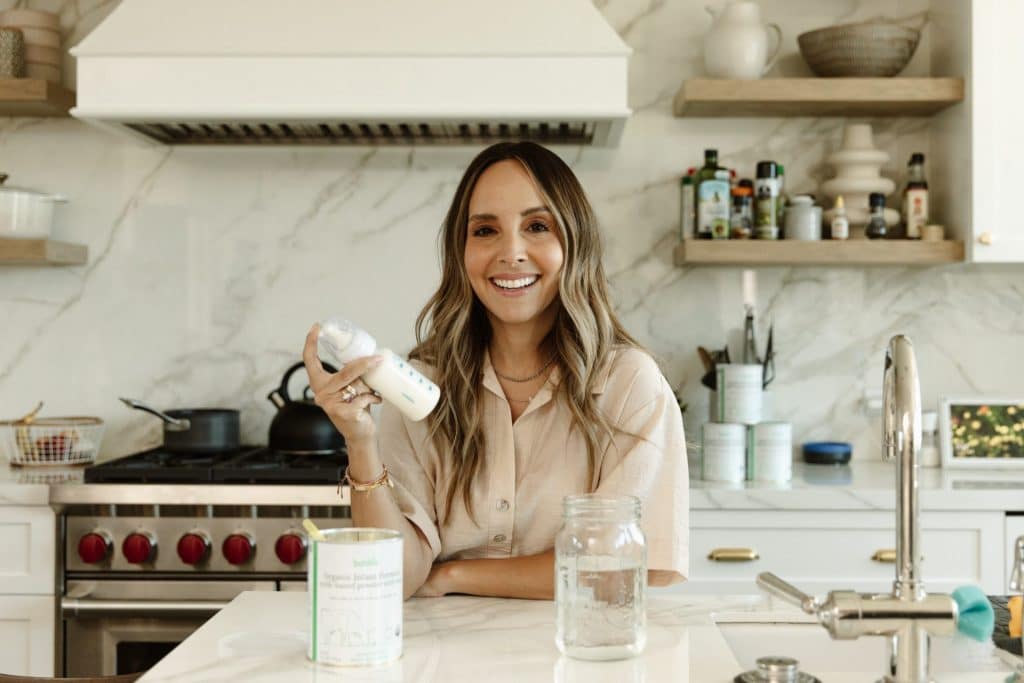
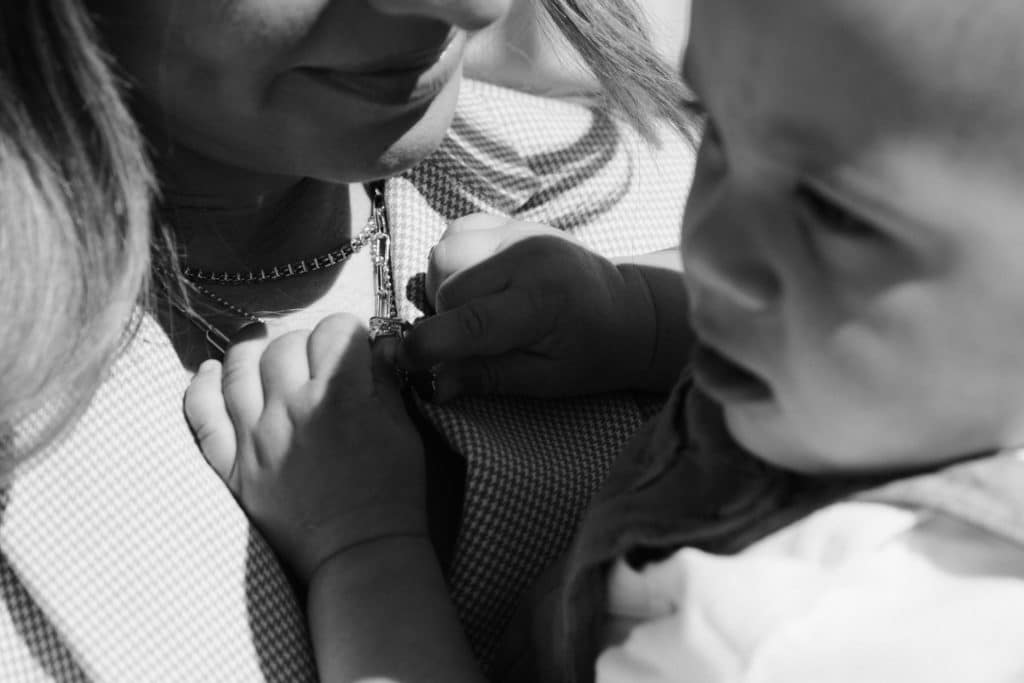
Stay tuned every month to get the scoop on modern parenthood from our community. And remember, you’re doing amazing.
xo,
Bobbie

